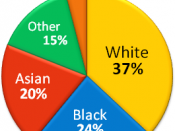"Congress shall make no law," declares the first amendment, "respecting an establishment of religion, or prohibiting the free exercise thereof, or abridging the freedom of speech, or of the press, or the right of the people peaceably to assemble, and to petition the government for a redress of grievances." (Burns, 2004) These words, written in a time so long ago, have become the way in which Americans define the word free. Freedom, as it pertains to us, is contained in that one simple sentence. Those words alone give us the right to free expression, free conscience; they grant us a free society. Without these civil liberties, the famed U.S. 'government by the people' would cease to exist. Seems as though it should be that simple - we are a country developed on independence and freedom, our rights are clear and concise. Yet as definitive as they may seem, somehow Americans have managed to blur the lines, to the point that it is all seen as gray terms.
Freedom of speech is no longer just that, it has become an issue of protected or non-protected speech. Along the way somewhere created these two new subcategories for freedom of speech. Non-protected speech is considered speech that lacks social redeeming value and is not essential to democratic deliberations and self-governance. You may talk about overthrowing the government, but use no reference to acting on your beliefs. You may not publish any obscenity with constitutional protection. What is obscenity? Courts had not yet been able to agree on how to define it until 1973 in Miller vs. California. A work may be considered legally obscene if (1) the average person, applying contemporary standards of the particular community, would find that the work, taken as a whole, appeals to a prurient interest in sex;...


